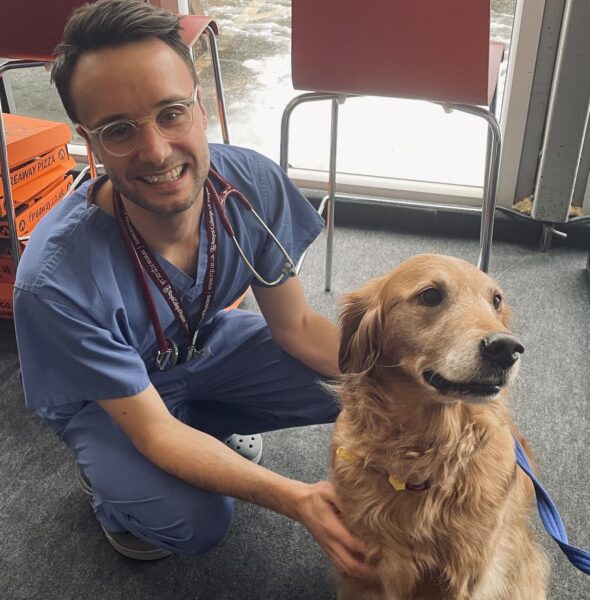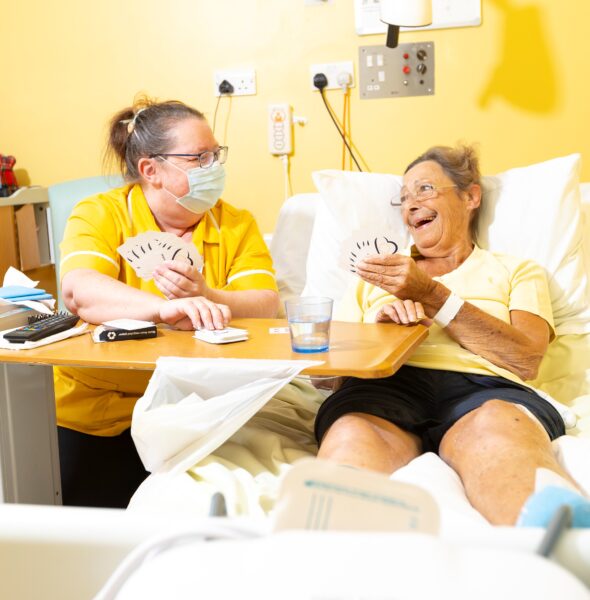What's wrong with a good old-fashioned house number?
“It is a real privilege to be invited into people’s homes, to see a glimpse of their lives and listen to the stories they have to tell.”
Three junior doctors, Conrad, Amy and Shona, who joined our west Kent Home Treatment Service on a three-month training placement have shared their thoughts on community practice and why it might just be the future for geriatric medicine.
“What did I miss about the hospital? Not much.” Conrad Witek

I was quite apprehensive to start working in the community. As an internal medicine trainee, I was at home in my familiar surroundings of the hospital. Unsurprisingly, I learnt a lot. No CT scanner, but I had my stethoscope and pretty much everything else I needed in the boot of the car.
The first task I quickly learned was the skill of actually finding your patient. Gone was the convenient ‘bed 12’ and instead, crawling along in first gear, squinting at front doors. I'm as big a fan as anyone for a lovely house name, but what happened to a good old-fashioned house number? Wait, that one's got a key safe and a handrail outside the front door - surely it must be this one!
There's an innumerable number of funny stories, but a lot of the humour comes from the day-to-day quirks that you'll miss if you don't take a step back every so often. Trying to stay cool in a crisis during the hottest day of the year, not helped by Mrs Smith, who has the heating on all year round. "No, I would not like a nice hot cup of tea, but thank you very much for the kind offer," I say, as I untangle the ECG leads with one hand and pet her overly enthusiastic dog with the other. To top it off there's a nosy neighbour who has suddenly decided to start re-arranging their bins outside. I'm sure they're about to sustain a neck injury from the angle that they're peering over the front hedge.
Jokes aside, what a privilege it is to step into our patients' homes and care for them in the real world, outside of the augmented reality of a hospital with its artificial fluorescent lighting, allowing them to be treated in the comfort of their own homes, and even more importantly die in the comfort of their own homes.
What did I miss about the hospital? Not much really. Your day is infinitely better driving through the countryside where you don't have the bells, buzzers and bowel movements of an inpatient ward. Not only is it great fun, it's a big part of the future of geriatric medicine.
“Community medicine is similar to being a medical detective” Amy Radcliffe

Amy Radcliffe
Outside the familiar sterile walls of the hospital and without the reassurance of imaging, bloods and regular observations, I quickly adapted, learning both clinical and non-clinical tips and tricks: the skill of subtly checking whether the seat was damp before you sat down in a patient’s home and dodging over-enthusiastic pets.
As my confidence and experience grew, I began to enjoy the freedom and variety of community medicine. One of my most poignant experiences was after reviewing a very polite, mildly confused patient with a complex surgical background who had acutely deteriorated, the decision was made to admit to the local hospital, as per his and his family’s wishes. A week or so later during my acute medical on calls at the hospital, I was asked to review an agitated aggressive patient on the ward. Yes, it was the same patient. This previously pleasant man was now extremely delirious, pulling out cannulas and spitting at members of staff. After spending over an hour trying to manage the situation, I reflected that although we all know sending patients into hospital can cause or worsen delirium, to witness the stark deterioration first hand was very humbling.
On the other hand, the positives of making a diagnosis with very limited investigations and the satisfaction when this is confirmed and the patient has improved, is much greater than you ever experience in the hospital. It is a real privilege to be invited into people’s homes and to see a glimpse of their lives and listen to the stories they have to tell.
Community medicine is similar to being a medical detective: using your skills to form a likely diagnosis but without the large comfort blanket that the hospital provides. I feel that as a medical trainee, this has been an invaluable experience particularly dealing with risk and identifying which patients are appropriate to send in vs those who would be more appropriate to treat at home. As we continue to see an aging population that is becoming increasingly frail with complex co-morbidities, community medicine is a rapidly growing specialty that currently medical trainees have very little exposure to.
“I found it so rewarding simply seeing the look on people’s faces when we said that they did not have to go into hospital.” Shona Mitchelmore

Shona Mitchelmore
I did not really know what to expect and I was quite nervous that I might not actually like community geriatrics after having told everyone that that was what I wanted to do! I needn’t have worried though, I found a deep satisfaction from caring for older adults in the community. The balance of managing acute medical issues in the context of frailty, with the added twist of being in people’s homes and juggling dysfunctional key safes, narrow country lanes and over-enthusiastic dogs!
It was certainly a challenge and required more flexibility and willingness to cope with uncertainty than in a hospital, as you can never be fully sure what you are walking into. Having access to point of care tests helped with decision making, however, not having imaging meant relying more on the clinical picture and accepting a higher level of risk that the diagnosis might not be correct and also that patients might deteriorate at home. It is a fine line to walk but one I found exciting and stimulating.
Although some elderly patients may feel more comfortable being cared for in hospital, for a large proportion, it is a place that they fear that they will go into and never come out again. Not an unreasonable fear, particularly in the wake of the COVID pandemic. It was satisfying to be able to care for them at home and to put measures in place to ensure that anyone looking after them in future would know what their wishes are. It was also affirming just how happy everyone tended to be to see you! One of my favourite memories was of a lady in her eighties with mild cognitive impairment who lived alone and had had a fall, I did all the history, examination and investigations (very exciting for a medical student, my normal role on placement being to open and close curtains!) and she was delighted to have someone to talk to and so pleased when she could do something correctly and help me with the examinations. She kept telling me ‘what a lovely lady’ I was and told me to ‘drop in for a cup of tea’ any time.
Although working in the community can be daunting, I felt that I learnt a lot about pragmatic, caring decision making which is defined by the patient and their needs and that the community is not a controlled environment and you have to be prepared to accept a bit of chaos!






